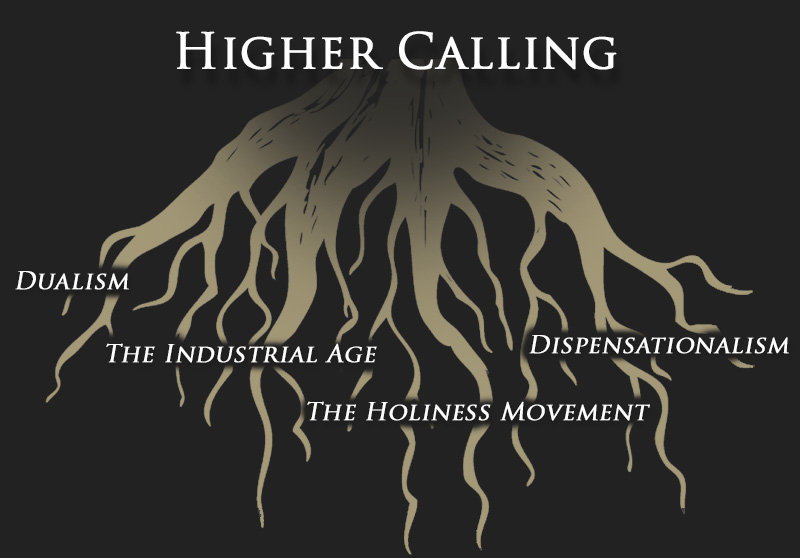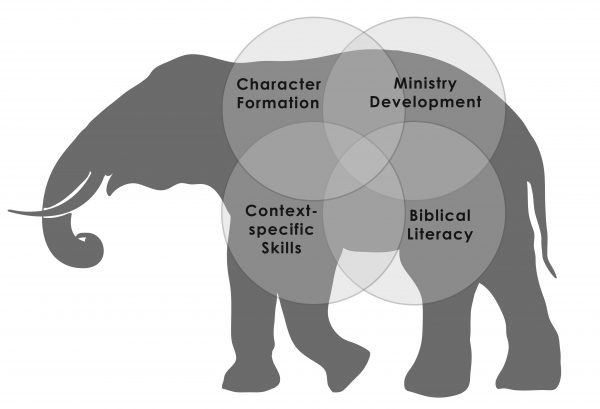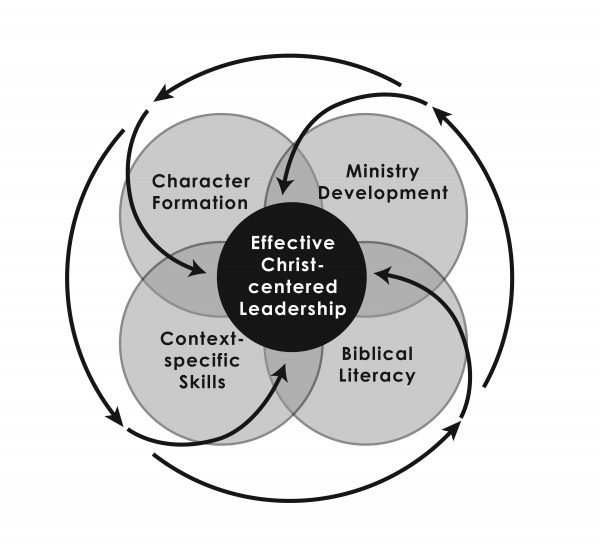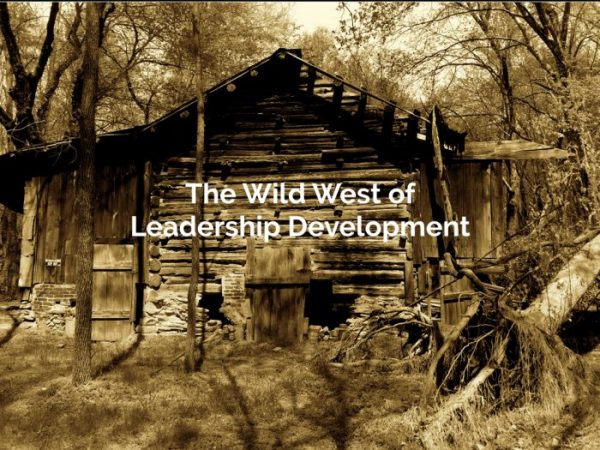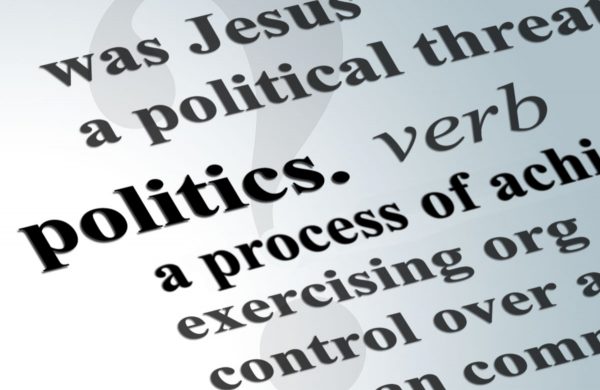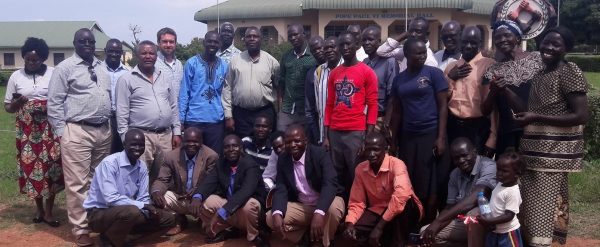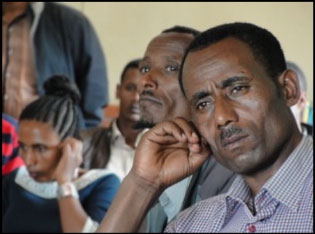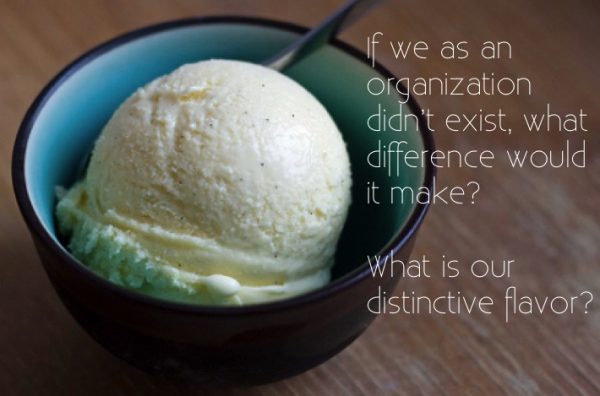“Servant leadership” is a term often used to describe how Jesus led – a servant to His followers. So are “servant leadership” and “Christ-centered leadership” one and the same? Or is there a distinction between a servant leader and a Christ-centered leader? Herman Hesse once told the story of a band of men on a mythical journey. The central figure in the story is Leo who accompanies the party as a servant. He does the menial chores for the group, but he also sustains them with his positive attitude and with song. Leo is a person of extraordinary presence. All goes well for the band of men until Leo disappears. At which time the group falls into disarray and their journey is abandoned. They cannot make it without Leo. Some years later, Leo is found and taken into the Order that sponsored the journey. As it turns out, Leo the servant, was the head of the Order, a noble leader. Servant as Leader The idea of Servant as Leader first came to Robert Greenleaf in 1958 as he read this story. At the time, he was an executive at AT&T, and was searching for approaches to leadership that would successfully mobilize the new generation of anti-establishment workers. In Servant Leadership: A Journey into the Nature of Legitimate Power and Greatness (1977), Greenleaf posed the question “Who is the servant leader?” He answered by writing: “The servant-leader is servant first . . . It begins with the natural feeling that one wants
Read moreSince last Summer, we’ve brought several prayer requests to you regarding conflicts here in the United States and around the world. There have been fears of civil war, coup d’etats, and tribal conflicts. Just last week we shared a prayer request regarding the need for peace and protection amid violent clashes in Senegal, West Africa. This week we praise God for news that a calm has returned to Senegal, but is calm the same as peace? Conflict is rarely neat, simple, or even clear. Sadly, the causes of conflict are many, but all conflicts demand a response.
Read moreChrist-centered leadership (CCL) has become familiar verbiage over the past decade. Like “servant leadership,” its usage is ubiquitous, but its meaning varies among those who use the term. A quick Google search for CCL yields a range of definitions that include acting with integrity, hearing God’s voice, and being anchored in the presence, power, and ministry of God. What distinguishes Jesus’ leadership in light of more dominant leadership models of His day and ours?
Read moreEffective leaders are known for their ability to inspire in others their vision for a preferred future. These leaders imagine how the changes inherent in their vision will benefit their employees, their target population, and their bottom line. But less often do leaders think carefully about what their vision will undo.
Read moreWe live in uncertain times. COVID-19 is the earthquake that is rocking us at the moment, but the pandemic’s devastating after-shocks will shake people and societies for years to come. As the disease ravages many lives, the economic and psychological impact of this virus will likely wreak havoc on a much greater number of the world’s population. As leaders face the challenging months ahead, how will others remember us when the dust settles? Jim’s story is instructional for leaders during the downturn.
Read moreThe biblical idea of the “gospel” is more than simply the individual salvation of men and women. Rather, the gospel impacts everything, including our work. This more robust idea of the gospel can be seen through a four-chapter biblical narrative: (1) Creation, (2) Fall, (3) Redemption, and (4) Fulfillment.
Read moreI am grateful for my church heritage that prioritized disciple-making around the world. Introducing men and women to the redeeming grace of Jesus Christ and cultivating them to become mature, reproducing leaders have been the privilege of my personal and vocational life. But the church’s penchant for lionizing missionaries and pastors – like myself – because of our status as “full-time ministers” has created a collective myopia in our ranks. This poor lens hinders us from seeing the broader landscape that is richly populated by Christian believers with enormous potential to advance the Kingdom as mechanics, marketers, mothers, and medical technicians.
Read moreThe church of my childhood graced me with priceless truths. But in church I also heard a half-truth. It is the notion that people who work in vocational Christian ministry have a high calling, and those who work in secular jobs don’t. This half-truth was more implied than overt, more caught than taught. It led me to choices I didn’t know I was making. Only later did I come to know how much this half-truth shaped my life, and how for countless others it has shut off whole worlds that might have been.
Read moreLast week examined the categories for effective Christ-centered leadership development that make up its components. An organization or ministry may focus on one or more of these categories.
- character formation
- biblical literacy
- context-specific skills
- ministry development
By sizing up the task before us, knowing we are functioning in these categories, we think that all’s well that ends well, right? Yes, but here’s the caveat. Research shows that “while every emerging Christ-centered leader needs all four of these categories to be truly effective, no single school or service provider is proficient to develop leaders effectively in all four categories.
Read moreLeadership Development Over the past several weeks we have been looking at how the term “leadership development” means a lot of things to a lot of people and without a common understanding of terms we might get lost in the wild west of expansion. Last week we at Freedom to Lead defined Christ-centered “leadership development” as “adult-focused, intentional cultivation that seeks to establish and enhance effective Christ-centered leadership practices.” However, merely having a working definition of leadership development is not sufficient to make the way forward. We need to size up the task before us.
Read moreLeadership development is often like the Wild West expansion in the mid 19thcentury. When I was in my elementary and middle school years you would most likely find me building forts in the woods creating a world of my own. My brother and I and our neighborhood friends would create new paths and “discover” new streams and ponds. These were simpler days when our time was set by the arrival of lightning bugs that signaled dinner was ready. One of my favorite forms of creative outside play was to imagine we lived in pioneer days, the days of covered wagons and panning for gold. Perhaps it was a unit we studied in school or this new computer program called “Oregon Trail” that inspired me, but I liked to imagine that quest of making our way west. At the time we lived just across the Hudson River from New York City. The idea of “westward expansion” to Oregon and California was mesmerizing.
Read moreWhen participants complete all eight modules of Freedom to Lead’s The Garden Project (a four-year investment that involves training and transference to another generation of leaders), they receive a certificate from Belhaven University. It’s really just some nicely printed words on a piece of paper. Or is it?
Read moreWe need a few great leaders. But we need a whole lot more good leaders. “Wait, did I read that right? you may ask. Don’t you mean from good to great?” No. We need a few great leaders, but we need a whole lot more good leaders. Here’s why.
Read moreShortly after Jesus was born, Herod killed all the boy babies in Bethlehem because he perceived this “King of the Jews” was a political threat. Was his perception correct?
Read moreFreedom to Lead International® (FTL) recently traveled to work with a group of second generation leaders that are being developed in Adjumani, Uganda through The Garden Project. These Christian leaders are primarily refugees that have fled from Sudan. In light of their war-torn lives, the Sudanese brothers and sisters found FTL’s module on Peacemaking to be especially relevant. When I returned home, I was reminded that we also need leaders who seek peace. Is All Conflict Sin?
Read moreA World in Need These past couple of weeks have seemed overwhelming. Hurricane Harvey in Texas. Wildfires in the Pacific Northwest. Floods in South Asia. Mudslides in West Africa. Earthquake in Mexico. And we are currently in the midst of historic Hurricane Irma as it is making landfall in the Caribbean and Florida. Out of a real sense of compassion we then respond in the ways we know how: we take out our checkbooks and offer our prayers, maybe even join the relief efforts if we are able. But, if we are honest, we are also asking “how do we go from one major crisis to another without being completely depleted? Can I really care about everything?” How do we respond as leaders without going mad?
Read moreThe 2020 Vision Statement of Freedom to Lead: In five years we will see 5000 storycentric leaders in 25 under-resourced countries being transformed into competent Christ-centered leaders. We’ve come to the last of the FTL Summer Blog Series where we have been unpacking FTL’s Vision Statement for the next five years. To recap, FTL is offering under-resourced leaders the opportunity to walk towards freedom, suggesting solutions that go beyond the economic. We have seen how each one of these 5000 targeted leaders has a name and a story. And while we can cultivate, God ultimately does the transforming. Last week we even began exploring the competence issue, though only in part. In conclusion, what is the thread that ties all this together? Competent Christ-centered leadership.
Read moreThe 2020 Vision Statement of Freedom to Lead: In five years we will see 5000 storycentric leaders in 25 under-resourced countries being transformed into competent Christ-centered leaders. For the FTL Summer Blog Series, we have been unpacking our Vision Statement for the next five years. First, we took a look at the “Freedom to Lead” part. What do we mean by “freedom”? Next, we examined the numbers, 5000 leaders from 25 countries. Last time we looked at the word “under-resourced.” And today we are talking about “being transformed.” I live on the third floor of an apartment building. I do not have access to a yard or a place to grow a garden, though I do have a small balcony. And because I decided my place needed some fresh life to it, I went out and bought a couple of planters not too long ago. First I started with seeds. After weeks of the wildflower seeds being burrowed with no visible fruit I was getting rather discouraged. Just as I was about to throw it away, this teeny tiny sliver of green gave me hope. Still, patience has never been something I’ve been good at. Perhaps the blooms will come yet. This time though, I decided to pack my planters with dirt, go to the nursery to pick out already blooming plants, and start from there. This time, I am determined to see them stay healthy. So far they have not died on me. Then I went to the craft store.
Read moreThe 2020 Vision Statement of Freedom to Lead: In five years we will see 5000 storycentric leaders in 25 under-resourced countries being transformed into competent Christ-centered leaders. For the FTL Summer Blog Series, we are unpacking our Vision Statement for the next five years. These past couple of weeks we have been looking at the “Freedom to Lead” part. We examined where we get this idea of “freedom.” Today we are looking at the numbers.
Read moreFor the FTL Summer Blog Series, we are unpacking our Vision Statement for the next five years. Today, we look at the “Freedom to Lead” part. Where do we get this idea? Why do we choose this as the name of our organization? In John 8:36 Jesus said, So, if the Son sets you free, you will be free indeed.” We believe the freedom he was offering was not just about eternity, but this freedom is a reality in this present lifetime, as lived out in our lives, in our ministries, and in our leadership. This kind of freedom sets leaders free to be all that they can be for Christ.
Read moreSeveral months ago, the team at Freedom to Lead gathered together to think strategically about the future. One of the things that came out of our meetings was a Vision Statement for the next five years. Over the last few weeks, this Vision Statement has been unveiled for partners, friends, and supporters.
Read moreGod is doing a new thing. I (Michelle) live and work in the world that is global church leadership. As a woman I am limited; as an unmarried woman without children, even more so. Lately I have been challenged by how I can maximize the freedom I have in Christ, not just in terms of my salvation, but also in terms of my life and leadership. Better yet, how can I encourage other women in the same way? As we study scripture, we see how women like Esther, Deborah, and Mary influenced others, pointed them to God, and helped them walk in His purposes. These women remind me that I can’t change the world, but I can be an influencer of it.
Read moreMost leaders I know want to finish well. Yet studies show that the majority of us don’t. Money, sex, pride, power, family problems, and plateauing are cited as the big barriers facing leaders who want to finish well. But what causes leaders to fall prey to these pitfalls? Why do successful, talented, and bright leaders so often sabotage their professional and personal lives through immoral and destructive behavior? Self-Centeredness In most cases, a fall is neither sudden nor without warning. On the contrary, the path of leaders to bad behavior is often a predictable process. The first step toward a downward spiral is growing self-centeredness. Leaders become increasingly confident about their accomplishments until they start to believe that they are special. As a result, they begin to make decisions in isolation, discounting the contributions and counsel of others.
Read moreToday finds me sitting by the Atlantic’s seashore in The Gambia, West Africa. Children are kicking up sand as they play soccer on the beach. They seem oblivious to this week’s FIFA scandal that has cast suspicion over just about every major decision in the soccer world over the past twenty-five years. Eighteen officials are charged with offenses including racketeering, fraud, and money laundering. Their cozy lifestyles of kickbacks and obscene per diems are finally on global display. Time has its insistent way of bringing truth to light.
Read moreBenchmarking is an aspect of strategic planning that has been widely accepted in recent years. It is the practice of comparing one’s organizational products or performance to others considered industry bests. Much can be said in its advocacy, but it has one potentially serious liability: benchmarking can result in vanilla ice cream.
Read moreHuman conscience acts like a judge, alternately accusing and defending us. Leaders rely on it. If the lens of conscience is clear, its job is to tap us on the shoulder and point out whether our walk matches our talk. In a perfect world, conscience acts as a safeguard to let me know I’m on track or as an arbiter to tell me I’m off course. Unfortunately, in real time, leadership gets complex and messy. The leader’s lens of conscience bends with the warp and woof of life.
Read moreDavid Burnham, renowned behavior science researcher and partner of the Burnham Rosen Group, states that the charismatic, visionary leader is being superceded by the leader who: (1) brings a focus on creating accountability within others, (2) cedes decision making to others, (3) encourages experimentation and flexibility, and (4) concentrates on building a shared sense of purpose and shared values. The formula for leadership success today is taking its script from the ancient past. The 21st century is finally catching up to Jesus’ paradigm for leading.
Read moreShark Tank is one of TV’s most watched programs The show’s popularity taps into our surging attraction for people with fresh products and plans for a morphing world. These entrepreneurs fuel the future for successful businesses, great societies, and Kingdom advancement.
Read moreWhat about terrorists? Yesterday we were challenged to look at The Compassionate Life a little closer. In the attempt to write a modern day parable similar to The Good Samaritan, we look at different kinds of people that cross our paths every day. I believe God brings certain people across our path for a reason, but sometimes we have to go TO them. As we think of these people, though, we ask ourselves the hard question: “what type of person is the hardest for me to extend compassion to?” And what does exactly does it mean to live the Compassionate Life?
Read moreSpiritual Leadership This post is part of a series on Spiritual Leadership. When FTL went into South Asia for the first time in 2010 we knew we were committing to a specific group of church and ministry leaders for the long haul. And they were committing to us. Although our initial commitment was a four-year program that would feature eight leadership development modules and one-on-one mentoring, we really didn’t know just how much God would stretch and mold and use us for His purposes. We heard the calling and had the vision. We even had what we thought was a clear strategy for Phase 1 of this ministry. We set out to make a dent on the world. But I don’t think any of us really expected the impact it would have, both on our lives personally and in the way we look at Christ-centered leadership.
Read moreBrendan Eich, co-founder and CEO of open source company Mozilla, was forced to resign this week after it came to light that he made a $1000 personal donation to the 2008 campaign seeking to ban same-sex marriage in California. Eich’s resignation was prompted after OkCupid, an online dating service, encouraged thousands of its customers to boycott Mozilla’s Firefox web browser.
Read moreThe predominant image of leaders in Jesus’ time – not very different from our own time – was that they were egocentric, oppressive, and in charge. Perhaps this is why Jesus never used the word “leader” when referring to his disciples. It seems that the conventional leadership values in his time were not those Jesus wanted to transfer to the future leaders of the church.
Read more




